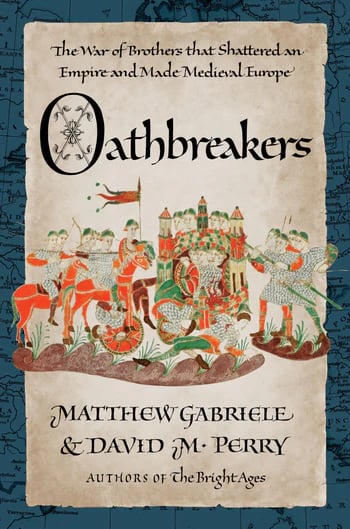Who we are! What we're reading!
A welcome for new subscribers.

Modern Medieval
by David M. Perry and Matthew Gabriele
Last week David published an op-ed at CNN about fishing and some hundreds of kind folks subscribed, so we thought this might be a good moment for some re-introductions.
We’re the authors of Oathbreakers: The War of Brothers That Shattered an Empire and Made Medieval Europe, coming out this December. It’s about the fall of Charlemagne’s empire in a civil war that everyone saw coming but no one believed would actually happen. It’s about how societies collapse. We wrote it because we think it’s one of the most exciting, if terrible, stories that comes out of the history of medieval Europe and we’re excited to share it with you. Please consider pre-ordering!

Before that, we wrote The Bright Ages: A New History of Medieval Europe. This book takes you on a sweeping journey through a thousand years of history, refuting the Dark Ages myth, and telling you why it matters.
Generally in this newsletter, we share reactions to medieval things in the news (next up: A stolen sword from France!), recommendations about new pieces of scholarship and popular writing, and our own thoughts about the profession of history and why studying the past does indeed matter.
*****
For now, we’ll close with a recommendation:
David thinks you should have a look at a book called Cunning Folk: Life in the Era of Practical Magic. He actually read it in the winter and was privileged to blurb the book, writing:
“The achievement of *Cunning Folk* is to make pre-modern magic seem not only real, but also reasonable, interwoven into everyday life in ways that don't feel antiquated. Through lively and extremely well-researched storytelling, Stanmore shows readers that for many people both medieval and modern, to believe in magic, to hope for magic, is part of being human.”
That’s blurbspeak, the kind of short copy that hopefully helps to sell books. But there’s a really significant point here. One of our goals in all our writing is to push the understanding that medieval people were, after all, people. They had all the capacity of modern and ancient people, even if (for reasons we talk about in The Bright Ages) they are often treated as something other, something lost between antiquity (Plato! Cicero! Augustine!) and now (Shakespeare! The Brontes! And, um, you!). But there were weird ideas and practices in other times that can impose a kind of distance between you, the modern, and the medieval. Just wait until you meet the demon Wiggo in Oathbreakers!
But what Cunning Folk does is take something that seems weird and make it seem rational, normal. Because it was rational/ normal in its context! Stanmore show ways in which medieval people had different superstitions and ways of knowing, but were not alien to us.
Think about that the next time you hit ten green lights in a row, feel lucky, and then buy a lottery ticket.
-
This made me go search out the CNN piece and I’m so glad I did. Well, glad and also furious—at Tractor Supply and bigots and the state of my country at the moment. Thank you David, for speaking out so eloquently. I have Bright Ages and look forward to reading Oathbreakers. I’m a sucker for anything about the Middle Ages in France, especially 11th-12th centuries.
-
Thank you! Have just ordered Cunning Folk. I loved reading Religion and the Decline of Magic at University & this sounds like a very welcome further exploration of this area.
-
Hi! I was on track to become a medieval art historian in 1986 on a Mellon fellowship when I got Pneumonia and went home to New Orleans. No jokes about A Confederacy of Dunces, please. My parents said they'd pay law school and I was harassed by the professor I went to study with (Pre Me -Too, and he was later dismissed for inappropriate conduct). I miss my studies and miss the field so much I've thought about returning at the age of 61. Looking forward to your newsletter.
Add a comment: